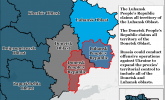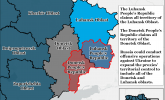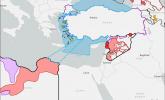Russia-Ukraine Warning Update: Russian Offensive Campaign Assessment, February 25, 2022
February 25, 2022 - ISW Press
Russian forces entered major Ukrainian cities—including Kyiv and Kherson—for the first time on February 25. Russian forces’ main axes of advance focused on Kyiv (successfully isolating the city on both banks of the Dnipro River). Russian military operations along Ukraine’s northern border have been less well-planned, organized, and conducted than those emanating from Crimea. They have also been less successful so far. The divergence in performance likely arises in part from differences in the composition and organization of the Russian ground forces elements in the Western Military District and Belarus (to Ukraine’s north) and Southern Military District and Black Sea Fleet (to its south and east), as ISW has previously observed. Determined and well-organized Ukrainian resistance around Kyiv and Kharkiv has also played an important role in preventing the Russian military from advancing with the speed and success for which it had reportedly planned. The Russian military has deployed additional forces to southeastern Belarus, likely beyond those Moscow had planned to use against Ukraine, to offset these problems and challenges. Russian forces remain much larger and more capable than Ukraine’s conventional military, however. Russia will likely defeat Ukrainian regular military forces and secure their territorial objectives at some point in the coming days or weeks if Putin is determined to do so and willing to pay the cost in blood and treasure.









